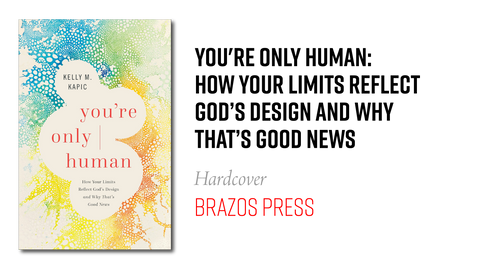My stack of books
Your cart is currently empty.
Find some books!
Many of us live in performance-oriented families and cultures where human identity is intrinsically connected with our work output. In our pursuit of living a meaningful life, we are left exhausted, disoriented, and confused. Most of all, we don’t know what God wants us to do with this short time we have on earth. In an age of ‘how-to’ books, laying yet another burden on the never-ending list of tasks is the last thing we need.
What we really need is a Biblical portrait of who we are, what God calls us to do, and how we can do this. Kapic’s book You’re Only Human does just that. It's the sort of book you need to take off your ‘to-read’ list and just start reading. Among the many reasons this book is worth reading, here are just three:
It’s tempting as Christians to think that our limitations are a mark of our sinfulness. Whether it’s our unrealistic expectations regarding our capacity, our need for rest and recreation, or our need to depend on other humans for help and support, our lives bear the marks of being made imago dei. That is, because we are not God, we have limits.
In You’re Only Human, Kapic offers a refreshing perspective on what it means to be a creature. He argues that only when we recognise ourselves as creatures can we truly flourish, both in our relationship with God and one another. He digs into the tendency of our hearts to live in perpetual guilt that we are not doing enough. Rather than offering a behavioural solution, Kapic gets to the heart of the issue — an unbiblical understanding of human finitude. When we deny this, we are ‘cripple[d] us in ways we don’t realize. It also distorts our view of God and what Christian spirituality should look like’ (p. 6).
Only when we come to recognise God as Sustainer — and therefore, our creatureliness — can we begin to rest on Him as dependent beings (cf. Psalm 46:10). Contrary to our productivity-driven age in which self is God, Kapic reminds us to find our identity not within, but in our relation to God as Creator. Only when we come to see this will we realise that our limits are not a curse.
A prominent feature of life in the 21st century is our obsession with identity. Identity, according to our postmodern age, is something self-generated. In other words, we discover out who we are when we look within. This, Kapic argues, always leads to confusion, pressure, and the atomisation of society. Instead, he argues that identity can only be understood through the lens of union with Christ. He writes:
“The fact that my identity must be in Christ doesn’t change the fact that I am this person and not that one…when our search for identity in Christ includes a healthy view of creaturely finitude and particularity, then we see something truly beautiful and unique take shape” (p. 73)
This reminder is much needed in our modern psychological age in which self-fulfilment is implicitly the goal of life. Kapic reorients us to Christ as the source of our identity and worth as unique creatures made in the image of God. Thus, human identity is not something which is self-realised, but rather comes about when we find ourselves in relation to the God who made us, and who united us to His Son (cf. 2 Corinthians 5:17).
Kapic points out an obvious but often forgotten truth: we grow as Christians when we live in community with God’s people. He presents the Biblical alternative to individualism, which upholds individual dignity whilst simultaneously affirming our identity as members of the body of Christ (cf. Ephesians 4:1-7; 1 Corinthians 12:12-31). He draws out the practical implications of this reality as it pertains to gathering with God’s people.
For starters, he highlights that we cannot grow as Christians in isolation from the people of God:
“It takes the whole church to be the one body of Christ. Serving and depending on others constitutes a twofold dynamic that builds up the community in faith, hope, and love. The diversity within the church’s unity displays God’s presence and action in this world” (p. 167)
Combatting our tendency to live in isolation, we must recognise that Christian maturity cannot happen unless we are invested in God’s covenant community. Neither Zoom church nor podcasts will suffice. In its most basic sense, being actively involved in the life of a healthy local church is a non-negotiable for Christians.
Many of us who struggled during the government-lockdowns of the last few years are painfully aware of how deep the need for face-to-face fellowship really is. It helps us appreciate the Apostle John when he writes:
“I had much to write to you, but I would rather not write with pen and ink. I hope to see you soon, and we will talk face to face.” (3 John 13-14)
You’re Only Human is a timely reminder that our worth is not determined by our performance, the opinions of others, or our feelings. Instead, liberty can only be experienced when we view ourselves as creatures of the living God. Regardless of how long you have been walking with Christ, I suspect this book will be transformative for how you consider your creatureliness.
If I were to use one adjective to describe this book, it would be refreshing. Far from leading us to despair, being reminded of our creatureliness leads us to lean upon our infinite God. After all, we all need to frequently be reminded that rest can only be found when we find our security and assurance in Jesus Christ. For only in Him do we realise that it truly is a good thing we’re only human.